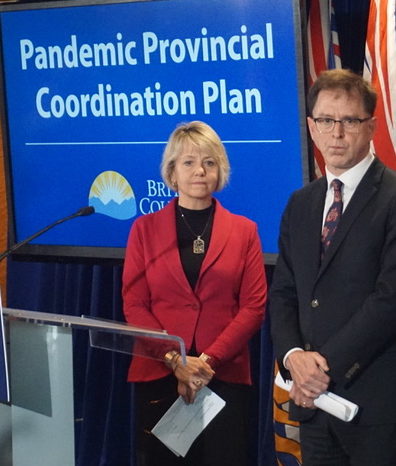
Bob Mackin
British Columbia is under state of emergency for at least the next two weeks and leisure travel to the United States is banned indefinitely because of the novel coronavirus pandemic.
Solicitor General Mike Farnworth invoked B.C.’s Emergency Program Act on March 18, four hours after Prime Minister Justin Trudeau and President Donald Trump announced the border would remain open for essential services and goods shipments only.

Mike Farnworth
While Farnworth’s move could bring relief from panic-buying, hoarding and profiteering from basic goods, like toilet paper, cleaning supplies and meat, the law also gives police extraordinary power to control travel inside B.C. and enter a building without a warrant. The law was declared the same day that the Provincial Court on the Downtown Eastside and the B.C. Supreme Court both shut down indefinitely for fear of infection from the Wuhan coronavirus.
Meanwhile, Provincial Health Officer Dr. Bonnie Henry’s March 17-declared public health emergency also means temporary erosion of British Columbians’ right to know.
Information and Privacy Commissioner Michael McEvoy announced March 18 that he is allowing the provincial government, agencies, Crown corporations and municipal governments to take an extra 30 business days to answer freedom of information requests received by April 30. That means it could take up three months, plus weekends and holidays, to receive documents. The decision is retroactive to March 1 and McEvoy left the door open for public bodies to ask for even more time to reply.
McEvoy said a large number of public bodies asked for assistance, but they do have to provide him a list by June 30 of every request for which the additional extension was invoked.
“It is clear that the situation has affected their operations and it is likely to continue to do so for some time,” McEvoy said by email. “I take notice of the fact that this interferes with public bodies’ ability to respond to requests for access to records within the time required under the Freedom of Information and Protection of Privacy Act. This extraordinary and unforeseeable situation will be monitored on an ongoing basis in case circumstances warrant this decision being revisited.”
The decision is understandable, but concerning, said the executive director of the B.C. Freedom of Information and Privacy Association.

B.C. Information and Privacy Commissioner Michael McEvoy (Mackin)
“We will be watching this closely,” said Jason Woywada by email. “While the pandemic will give rise to reasonable challenges related to the timely processing of FOI requests, it is vital that the public’s right to know not be compromised.”
Woywada said if ever there was time for extensive public interest disclosure and fulsome transparency, it is now. The law contains a public interest override clause that states a public body must, without delay, disclose information that is about a risk of significant harm to the health or safety of the public or a group of people.
“Clear and comprehensive transparency from government bodies will help to counteract precisely the kinds of mis-, dis- and mal- information that circulate in a vacuum during an emergency of this magnitude,” Woywada said.
The decision by McEvoy does not preclude making requests nor does it mean a request can be dismissed out of hand, he added.
McEvoy said he believes public bodies are aware of their responsibility to adhere to the public interest override section of the law and it does not need further elaboration.
“It is up to public bodies to exercise discretion with respect to proactive disclosure,” McEvoy said. “It is fair to say, based on media reports, that public bodies are struggling to do their best to get important information to the public while grappling with responding to the public health emergency in other ways.”
Woywoda is also concerned about the security of information, with many government workers taking their work home to continue their jobs.
“Beyond the impacts to FOI with this extension, we are concerned about how shifts to increased use of personal devices and remote work may impact the production and preservation of records (ie a duty to document concern) within public bodies,” he said.
McEvoy released a one-page tip sheet for public bodies and organizations setting-up remote workspaces in the wake of the pandemic.
He recommended protecting mobile devices and passwords; encrypting and password-protecting portable hard drives and USBs; keeping software updated; using work emails, not personal accounts; and only removing personal information from the office if necessary.
“General rules of thumb: Avoid viewing personal information collected and used for work in public. If you must, take precautions to make sure no one else can view the personal information,” McEvoy wrote.
On March 18, Henry announced another 45 cases in British Columbia, bringing the total to 231. Seven people have died, while five have fully recovered.
Henry and Health Minister Adrian Dix provided a breakdown of cases by health authority, but did not disclose whether the new cases are the result of foreign travel or community transmission. Unlike other jurisdictions, the government’s coronavirus website does not provide an anonymized, case-by-case analysis.
That inspired a question from a radio reporter in B.C.’s interior on Dix and Henry’s teleconference.
“Our listeners are telling us daily that Northern Health and Interior Health are too vague when it comes to releasing numbers of cases, they say it’s causing rumours to spread around communities,” the reporter said. “Other provinces, like Ontario, are more specific.”

Dr. Bonnie Henry (left) and Health Minister Adrian Dix on March 6. (Mackin)
Said Henry: “It’s partly privacy, but it’s partly because we need everybody to be aware that the risk is not just in one place, it’s not just them and over there, it’s in your community too and you need to be taking these measures now everywhere in B.C., and across Canada, and, quite frankly, globally, now because this is being transmitted rapidly.”
By comparison, Ontario publishes a daily list of new confirmed positive cases, each with a case number, the sex and approximate age of the patient, name of public health unit, method of transmission (ie. community, travel country or continent, or close contact) and patient status (ie. self-isolating).
Washington State publishes a daily, county-by-county list of positive/confirmed cases and deaths and confirmed cases by age bracket and sex.
The Ontario and Washington governments both release more information than B.C., while successfully the confidentiality of patients.
- Looking for information on how to keep yourself and others healthy amid the coronavirus pandemic? Do you have symptoms? Click here for all you need to know, from HealthLinkBC.
Support theBreaker.news for as low as $2 a month on Patreon. Find out how. Click here.











